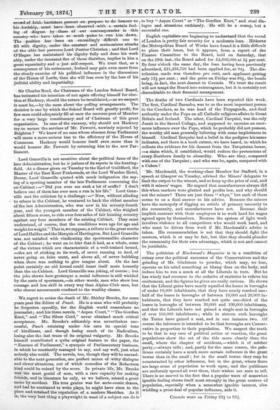The politician of Blackwood's Magazine is in a condition of
extasy over the political successes of the Conservatives and the grinding of Mr. Gladstone to powder, which may, we fear, operate on his mind something as bhang does on the body, and induce him to run a muck at all the Liberals in turn. But he has wisely had recourse to the sedative of statistics to relieve his excitement, and the figures he gives are really curious. He shows that the Liberal gains have nearly equalled the losses in boroughs of under 10,000 inhabitants, that they have nearly reached one- half of the losses in boroughs of between 10,000 and 20,000 in- habitants, that they have reached not quite one-third of the losses in boroughs of between 30,000 and 100,000 inhabitants, and that the Liberals have not gained a single seat in boroughs of over 100,000 inhabitants ; while in sixteen such boroughs the Tories have gained a seat, and in one instance two. Of course the inference is intended to be that boroughs are Conser- vative in proportion to their population. We suspect the truth to be that in any case of political action or reaction, the great populations show the set of the tide more clearly than the small, where the chapter of accidents,—which is of neither party,—always tells ; and, partly for the same reason, the Fib- heaps certainly have a much more certain influence in the great towns than in the small ; for in the small towns they may be counteracted by other influences, but in the great, where there are large areas of population to work upon, and the publicans are uniformly spread all over them, their wishes are sure to tell. There is no marvel in the fact that a popular wave of somewhat ignoble feeling shows itself most strongly in the great centres of population, especially when a somewhat ignoble interest, also wielding a great deal of popular influence, aids it.


































 Previous page
Previous page